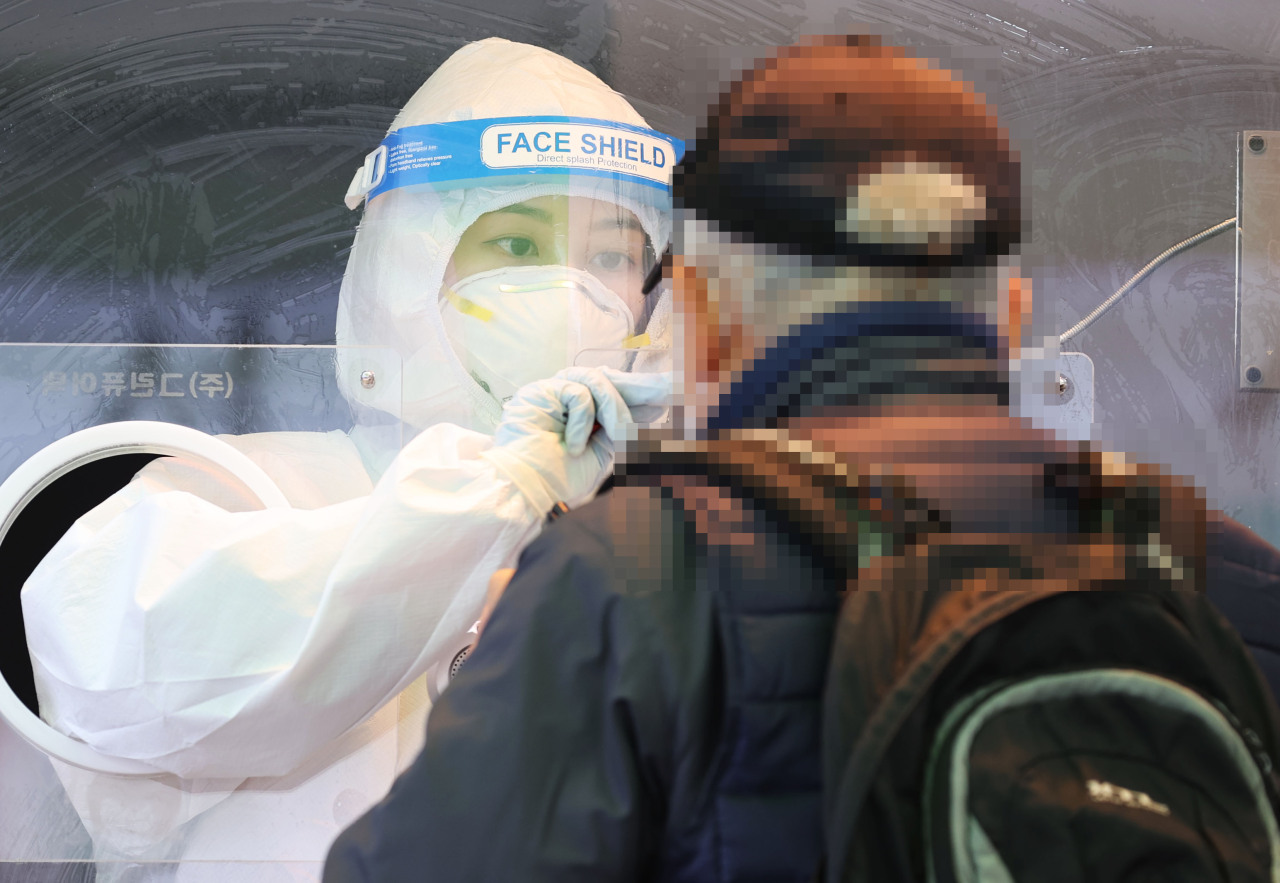S. Korea reports first COVID-19 fatality involving patient in 20s

A health care worker conducts nasal swab test at a testing center near Seoul station on Saturday. Yonhap via The Korea Herald/Asia News Network
SEOUL — A patient in his or her mid-20s died Friday, becoming the youngest in Korea and the first under 30 to die with COVID-19, health officials said over the weekend.
The Busan patient, who had preexisting complications from a cerebrovascular disease, died just a day after being confirmed with COVID-19, according to the city office. Before symptoms appeared Thursday, the day of diagnosis, the patient had yielded negative results in PCR tests for the third consecutive day on Wednesday.
In a response to The Korea Herald’s question, a municipal health official said the patient initially had moderate symptoms such as fever which seemed to have rapidly worsened into an acute pneumonia.
The patient was one of some 25 cases tied to an outbreak at a rehabilitation hospital in central Busan. The hospital, where a first case was found Feb. 4, has since been put under quarantine with all of its staff and patients barred from leaving.
“The coronavirus attacks blood vessels, which makes patients with vascular conditions particularly more vulnerable,” said respiratory disease specialist Dr. Chun Eun-mi.
Article continues after this advertisementTo date, COVID-19 has claimed the lives of at least 1,522 people in Korea. By age, people aged 80 or older account for over half of the total at 56.9 percent, followed by people in their 70s at 27.2 percent, and people in their 60s at 174 or 11.5 percent.
Article continues after this advertisementMeanwhile the Ministry of Health and Welfare decided to ease social distancing regulations starting Monday nationwide, amid concerns another spike may coincide with COVID-19 vaccinations that are slated to begin the last week of February.
The second-strictest scheme of social distancing, which restricts late-night operations of contagion-prone businesses, has been in place since Dec. 8. Under the relaxed rules, “high risk” businesses such as karaoke lounges, indoor concert arenas, food outlets and gyms can run normal operating hours. Bars and nightclubs with escorts and similar places can stay open until 10 p.m.
The ban on private gatherings of five people or more will remain in effect, although gatherings consisting of family and relatives are now exempted.
In a news briefing, Health Minister Kwon Deok-cheol explained easing off on social distancing was “unavoidable” to salvage the economy and to relieve the public fatigue with the mitigation behaviors. “But if there are signs of infections flaring up again, the government will be forced to restore the measures that are being lifted,” he added.
Prime Minister Chung Sye-kyun said “Korea may have embers of the virus that haven’t been put out,” while touting the necessity of some easing in restrictions all the same. “The key pillar of our pandemic battle from this point on is voluntary compliance without forcing closures so that the imminent vaccinations can proceed with success,” he said.
Experts worry weaning off of social distancing at this point might be risky.
According to a model by preventive medicine specialist Dr. Jung Jae-hun, Korea could face a fourth and the biggest yet wave of COVID-19 between March and April, with the number of cases reaching as many as over 2,000 a day.
“Most of the mitigation efforts that have been implemented during the December peak are better to be maintained until the winter is over,” he said.
Dr. Jung Ki-suck, former director of the Korea Centers for Disease Control and Prevention Agency, said the situation in the capital region was more troubling.
“In Seoul and the nearby cities, cases have been climbing steadily since end-January. The R value in the area for the past two weeks is also calculated to be greater than 1, which means the virus will keep spreading,” he said, referring to an epidemiological metric called R0 that indicates the average number of secondary cases generated per case.
Virologist Dr. Paik Soon-young said given the presence of new variants in the community, more discretion was probably needed.
“Based on limited information available, the variant that was discovered by the scientists in the UK may spread more easily, and it may even proliferate more profusely in the body,” he said. He added that growing evidence also suggests the variant first identified in South Africa may weaken the efficacy of the current vaccines.
Korea is one of the few countries in the world with confirmed cases of all three variants. By Saturday’s count, the number of cases caused by new variants rose by eight to reach 88, all of which were recent international arrivals.
The Korea Disease Control and Prevention Agency announced 304 locally transmitted and 22 imported cases of COVID-19 on Sunday, bringing the cumulative tally to 83,525.
For more news about the novel coronavirus click here.
What you need to know about Coronavirus.
For more information on COVID-19, call the DOH Hotline: (02) 86517800 local 1149/1150.
The Inquirer Foundation supports our healthcare frontliners and is still accepting cash donations to be deposited at Banco de Oro (BDO) current account #007960018860 or donate through PayMaya using this link.